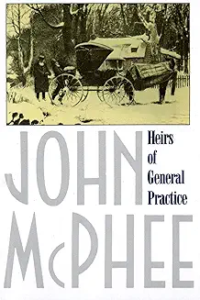Heirs of General Practice by John McPhee 1984
“Heirs of General Practice” is McPhee’s 18th book, and like the prior 17, it’s a wonderful deep dive into a topic that has caught his interest. In this case, it’s the rise of family practice as a medical/surgical specialty in the early 1980’s.
Having graduated medical school in 1971, I became the antithesis of the family practitioner. Wheras the latter needed to have a broad knowledge of all of the medical specialties and a focus on the patient as a person in a family, I was working diligently in the NICU of three Harvard teaching hospitals as a classic academic specialist—teaching, doing research, and caring for critically ill newborns. I needed to know a lot about those babies but not much about anything else in medicine.
McPhee focuses on this dichotomy of the specialist and the generalist and how organized medicine was dealing with this tension and ‘turf’ battles in a particular geographic setting—small town rural Maine in the early ’80’s. He achieved this focus through in depth portraits of a dozen or so family practitioners who upon graduating from med school headed to Maine to live a life and professional style that they aspired to.
One of those doctors was Susan Cochran, the daughter of my dear mentor, colleague, and friend, the Harvard neonatologist Will Cochran who died two years ago at the age of 96, still as funny, sharp, and iconoclastic as when I met him in 1972. Because of knowing one of these doctors, at least indirectly, I had been interested in McPhee’s book for years and finally read it.
It was eye-opening to hear the voices of these idealistic young doctors who were my contemporaries and who followed a path that was nearly 180 degrees different than mine. McPhee also managed to provide dozens of conversations between these doctors and their patients. Did he record them or was he in the room? Did he have permission from the patients? Why would the doctors and patients agree to this ‘invasion’ of privacy? Whatever the answers, this was a fascinating book and left me with all those old questions about how I ended up as a super specialist in a Harvard NICU when I originally wanted to be a doctor like my own pediatrician, making house calls and helping people.
Whether you’re a doctor or a patient (and who of us isn’t the latter eventually???), this is a fascinating book written by a master of the long non-fiction essay. I’m about halfway through McPhee’s ouevre and haven’t hit a dud yet. The guy is amazing.



